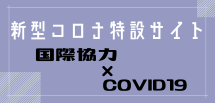IDJ English - International cooperation in a post-COVID-19 world Special
To double the healthcare-medical cooperation budget
Strongly promote "Human Security"
Junichi Yamada, Executive Senior Vice President of Japan International Cooperation Agency (JICA)
Since 2019, the Japan International Cooperation Agency (JICA) has been promoting “Human Security 2.0” to re-examine the threats in today’s society and create a social system resilient to various threats. Given the global reaffirmation of the importance of human security in the wake of the COVID-19 crisis, what kind of cooperation will JICA promote in the future? Junichi Yamada, who became the Executive Senior Vice President of JICA in May this year, speaks out.
ODA loan to be raised to over 44 billion yen
In response to the COVID-19 pandemic, JICA is currently advocating "human security" to protect lives, livelihoods and dignity in response to threats including infectious diseases. Cooperation for people to live better, such as educational support, is still important. But I realize again that supports directly linked to saving human lives are also significant.
To achieve this, JICA plans to double the scale of each of the programs of ODA loan, grant aid, and technical cooperation in the field of health care in the medium term. With ODA loan, we aim to raise the annual average of 21.9 billion yen to more than 44 billion yen in five years. It will be used for hospital construction and the spread of Japanese medical systems. By combining this with technical cooperation, we would like to develop human resources, including the provision of equipment, to improve the local IT environment.
Furthermore, we are planning further cooperation such as connecting Japanese medical institutions and local medical institutions online and providing technical guidance including measures for COVID-19 remotely. These efforts will lead to the overseas expansion of Japanese medical corporations and the export of Japanese medical systems and technologies.
In addition, in the supplementary budget for FY2020, the implementation of “The COVID-19 Crisis Response Emergency Support Loan” has been decided, amounting to 500 billion yen over two years. Loan agreements (L/A) have already been signed with the Philippines on July 1st, with Indonesia on August 3rd, and with Bangladesh on August 5th. Online discussions are being held with other Asian countries, and L/A will be concluded in sequence.
In the international society under the COVID-19 crisis, China is strengthening its presence by developing mask diplomacy and dispatching its own medical teams to approximately 30 countries. We recognize that it is necessary to promote cooperation aimed at “human security” in order to compete with China.
On the other hand, in the infrastructure field as well, we plan to promote initiatives in response to the Post-COVID-19 Era. For example, we will focus on medical infrastructure such as hospitals and medical equipment, which is one of the pillars of the “New Strategy for Overseas Development of Infrastructure” compiled by the Economic Cooperation Infrastructure Strategy Council in July.
Localization required for consulting business
Under such circumstances, we make efforts so as not to reduce the number of new publicly announced projects even in the COVID-19 crisis. As of July, announcements are made on the premise that business trips to the project sites can be resumed after October. But if it is difficult, we will take measures such as shifting them to domestic work. We are also considering ordering projects that can be fully covered by domestic operations.
On the other hand, six countries, Vietnam, Thailand, Myanmar, Laos, Cambodia and Malaysia, have already deregulated travel restrictions for JICA officials, and JICA experts have begun to return to these countries.
I think that the number of countries that resume travel will gradually increase in the near future. Our decision to resume travel will not be set as a uniform standard, and will be decided according to the situation in each country.
However, while the end of the COVID-19 crisis is uncertain, there will be many places such as Africa and Latin America where travel restrictions will continue for the time being. Under such circumstances, in addition to remote project implementation, it may be more necessary than ever to promote “localization” and establish a system that can utilize local resources. Japanese companies that already have local subsidiaries in Myanmar, the Philippines, and so forth, are proceeding with their business in collaboration with them.
Localization will also strengthen the price competitiveness of companies. The selection method for consultant contracts (project implementation contracts) will be completely switched to the QCBS (Quality-and Cost-Based Selection= technology / price evaluation method) in the future. As the weight of price points increases, it is expected to be advantageous to those companies that can reduce labor costs by localization.
Full-scale DX in collaboration with business community
Digital transformation (DX) is also inevitable for the development of Post-COVID-19 in developing countries. Some developing countries have said, “we like to rely on Japan for the construction of traditional infrastructure, but we like to rely on China for software, especially when introducing cutting-edge technology”. DX has become an urgent issue for Japanese development cooperation.
Therefore, in December 2019, JICA launched a task force under the direct leadership of President Shinichi Kitaoka and examined the possibility of digital utilization in ODA projects. In the process, in collaboration with the Japan Business Federation (Keidanren), we created a menu book that combines solutions that utilize the digital technology and know-how of private companies with ODA projects.
A total of 65 menus are listed in this menu book.All of them are proposal projects by private companies, and ODA schemes and the estimated amounts that are expected to be used are also suggested. In the future, we aim to incorporate these into our ODA projects.
For example, by collecting policies, laws and regulations in the health care field of developing countries and creating a database, we will create an environment that is easy for private companies to invest in. We will also promote digital health initiatives introducing the new public health infrastructure utilizing innovative technologies including remote medical care and drones.
In June 2020, the “Office for Science, Technology and Innovation, and Digital Transformation” was newly established in the Governance and Peacebuilding Department to take over the activities of this task force. This menu book is translated into English and will be proposed to the governments of the partner countries in order to utilize DX in full scale with all schemes of ODA. We want development consulting companies to use this menu book when conducting feasibility studies (F/S) and business proposals.
Contribution to revitalizing the Japanese economy
In order to continue the ODA project while the Japanese economy is exhausted, it is essential to gain the understanding of the public. For this reason, JICA hopes to contribute to the revitalization of the Japanese economy in four ways: (1) continuing infrastructure exports, (2) accepting foreign human resources, (3) expanding the pro-Japanese network, and (4) supporting the overseas expansion of SMEs.
In (1), we like to support the further growth of the Japanese economy through infrastructure development in developing countries. In (2), we intend to have the OBs and OGs of the JICA Overseas Cooperation Volunteers play an active role as a link between local autonomous bodies and residents and foreigners by making use of their own experience and language skills. In(3), under the initiative of President Kitaoka, we promote “JICA Development Studies Program (JICA-DSP)” by inviting human resources who can become leaders supporting the future of developing countries to Japanese universities and systematically learning about Japan’s modernization and development experiences.
In addition, we would like to revitalize the local regions of Japan by promoting the internationalization of SMEs through the efforts in (4).
Through these, we aim to be a JICA that is useful, not only in developing countries, but also in solving social issues in Japan.
International Development Journal 2020 September edition
*****以下、日本語原文*****
保健医療分野の予算倍増へ
「人間の安全保障」を強力に推進
国際協力機構(JICA) 副理事長 山田 順一氏
国際協力機構(JICA)は2019年から、現在の社会における脅威を改めて見つめ直し、様々な脅威に対して強靭な社会システムを作る「人間の安全保障2.0」を推進してきた。コロナ危機を受けて世界的に人間の安全保障の重要性が再認識されている中、JICAは今後、どのような協力を展開していくのか。今年5月にJICA副理事長に就任した山田順一氏に聞いた。
円借款は440億円超へ引き上げ
今回の新型コロナウイルスの感染拡大を受けて、JICAは現在、感染症をはじめとした脅威に対応して、命・暮らし・尊厳を守る「人間の安全保障」を掲げている。教育支援など人々がよりよく生きるための協力も重要であることに変わりはないが、人間の命を救うことに直結する支援も重要だと改めて認識した。
これを実現するため、JICAは今後中期的に、保健医療分野で円借款、無償資金協力、技術協力プロジェクトそれぞれの事業規模を倍増する計画だ。円借款では、現在の年平均219億円から5年後に440億円以上に引き上げることを目指したい。病院建設や日本の医療システムの普及などに活用することが想定される。これに技術協力を組み合わせ、現地のIT環境の整備に向けて機材供与も含めて人材育成を行いたいと考えている。
このほか、日本の医療機関と現地の医療機関をオンラインでつなぎ、新型コロナ対策も含めた技術指導を遠隔で行うといった協力も構想している。こうした取り組みは、日本の医療法人の海外進出、日本の医療システムや技術の輸出にもつながるだろう。
加えて20年度の補正予算では、2年間で5,000億円に上る「新型コロナウイルス感染症危機対応緊急支援円借款」の実施が決定している。すでにフィリピンでは7月1日、インドネシアでは8月3日、バングラデシュでは5日に借款契約(L/A)の調印を終えたところだ。他のアジア諸国ともオンライン上で協議を重ねており、順次L/Aを締結していく予定だ。
コロナ禍の国際社会においては、中国がマスク外交を展開したり、自国の医療団を世界の約30カ国に派遣したりと、その存在感を強めている。中国に伍していくためにも、「人間の安全保障」を目指した協力を推進していく必要があると認識している。
他方、インフラ分野でも、ポストコロナに対応した取り組みを進めていくつもりだ。例えば、7月に経協インフラ戦略会議がとりまとめた「インフラ海外展開に関する新戦略」の中でも柱の1つとして据えられている、病院や医療機材などの医療インフラは重視していく。
コンサルに求められる「現地化」
そうした中で、コロナ禍においても新規の公示案件の数は減らさないようにしている。7月時点では10月以降に現地出張が再開できる前提で公示を行っているが、難しい場合には国内作業に振り替えてもらうなどの対応を取っていく。すべてを国内業務で賄えるような案件の発注も検討しているところだ。
他方、すでにベトナム、タイ、ミャンマー、ラオス、カンボジア、マレーシアの6カ国ではJICA関係者の渡航制限を緩和しており、これらの国へはJICA専門家の帰任も始まっている。
渡航を再開する国は今後も徐々に増えていくと思う。なお、渡航再開の判断は一律の基準を設けずに、その国の状況に応じて随時行っていくつもりだ。
とはいえ、新型コロナの終息の目途が立たない中ではアフリカや中南米など渡航制限が当面続くところも多いだろう。そうした中では、遠隔による事業実施に加えて、「現地化」を進めて現地リソースを活用できる体制を整えることもこれまで以上に必要になってくるかもしれない。すでにミャンマーやフィリピンなどに現地法人を持つ日本企業は、彼らと連携しながら事業を進めている。
現地化は、企業の価格競争力を強めることにもなる。コンサルタント等契約(業務実施契約)の選定方式は将来的にQCBS(技術・価格評価方式)へと全面切り替えとなる。価格点の比重が大きくなる中では、現地化により人件費などをコストダウンできる企業が有利になることも予想される。
経団連とも連携しDXを本格化
ポストコロナの途上国開発においては、デジタルトランスフォーメーション(DX)も欠かせない。途上国の一部では「伝統的なインフラの施工は日本に頼みたいが、ソフト面、特に最先端の技術を導入する際は中国に頼みたい」という声も聞かれるなど、DXは日本の開発協力において喫緊の課題となっている。
そこでJICAは19年12月、北岡伸一理事長直轄のタスクフォースを立ち上げて、政府開発援助(ODA)事業におけるデジタル活用の可能性を検討した。その中で、(一社)日本経済団体連合会(経団連)と共同で、民間企業の持つデジタル技術やノウハウを活用したソリューションとODA事業を組み合わせたメニューブックを作成した。
このメニューブックには全部で65のメニューが掲載されているが、全て民間企業による提案事業であり、活用が想定されるODAのスキームや金額の目安も試算されている。今後はこれらをODA事業の中に取り入れていくことを目指す。
例えば、途上国の保健医療における政策や法律、規制などを集めてデータベース化することで、民間企業にとっても投資しやすい環境を整えるとともに、遠隔医療やドローンなどを活用した新たな公衆衛生インフラの導入を見据えたデジタルヘルスの取り組みを進めていくといったものがある。
2020年6月にはこのタスクフォースの活動を引き継ぐ形で、ガバナンス・平和構築部の中に「STI・DX室」を新設した。ODAのあらゆるスキームでDXを本格化させるべく、ゆくゆくはこのメニューブックを英文化しており、相手国政府へ提案していくつもりだ。ぜひ開発コンサルティング企業の方々にも、フィージビリティ調査(F/S)や事業の提案時にこのメニューブックを活用していただきたい。
日本経済の活性化にも貢献
日本の経済も疲弊している中でODA事業を続けていくには、国民の理解を得ることが必須だ。そのため、JICAとしては、①インフラ輸出の継続、②外国人人材の受け入れ、③知日派・親日派の拡大、④中小企業の海外展開支援、という4つの点で日本経済の活性化にも貢献していきたいと考えている。①では、途上国のインフラ整備を通じて日本経済のさらなる成長を後押ししたい。②では、JICA海外協力隊のOB・OGに自身の経験や語学力を生かして、地方自治体や住民と外国人とをつなぐ存在として活躍してもらうつもりだ。
また、③においては、北岡理事長のイニシアチブの下、途上国の未来を支えるリーダーとなり得る人材を日本の大学へ招き、日本の近代化の経験などを体系的に学んでもらう「JICA開発大学院連携」を進めている。また、④の取り組みによって中小企業の国際化を促進することで、日本の地方を活性化させていきたい。
これらを通じて、われわれは途上国のみならず、日本の社会課題の解決にも役立てるJICAを目指していく。
『国際開発ジャーナル』2020年9月号掲載記事



国会議事堂202004-300x225.jpg)
ジャーナル2020年7月号「世界を読む」-300x141.jpg)
